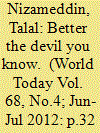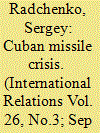| Srl | Item |
| 1 |
ID:
090850


|
|
|
|
|
| Publication |
2009.
|
| Summary/Abstract |
This article examines the little known history of political collaboration between Caucasian national groups and Japan directed against the Soviet Union in the 1930s. The collaboration, begun at the time of the 1904-1905 Russo-Japanese War, resumed in the 1920s and continued through World War II. The Caucasian groups (Haidar Bammat's 'Caucasus Group' in particular) and Japan worked together to pursue their common goal of dismembering the Soviet Union. Their anti-Soviet subversion was real yet achieved few results in the face of extraordinary Soviet security. Nevertheless, Stalin took no chances and terrorised anyone suspected of any possible link to the subversive activity.
|
|
|
|
|
|
|
|
|
|
|
|
|
|
|
|
| 2 |
ID:
123255


|
|
|
| 3 |
ID:
117430


|
|
|
|
|
| Publication |
2012.
|
| Summary/Abstract |
This article reviews major issues in the historiography of the Russian/Soviet side of the Cuban missile crisis, as it has developed since the early 1990s. Focusing on key works, including Fursenko and Naftali's One Hell of a Gamble and Mikoyan's Anatomi'ia Karibskogo Krizisa, the article explores three issues: why Nikita Khrushchev decided to send missiles to Cuba, why he resolved to withdraw them, and how close the world came to 'the brink'. The author contends that in our understanding of the Kremlin's motivations in the Cuban missile crisis, we have come to over-rely on disparate pieces of 'evidence', which, at closer investigation, turn out to be one-sided, undocumented, or demonstrably false. The author therefore urges caution in drawing far-reaching conclusions from the crisis, especially in projecting its uncertain lessons onto the broader scholarship on the Soviet decision making during the Cold War.
|
|
|
|
|
|
|
|
|
|
|
|
|
|
|
|
| 4 |
ID:
030495


|
|
|
|
|
| Publication |
California, California seminar on Arms control and foreign policy, 1976.
|
| Description |
xv, 79p.
|
| Series |
Research paper no; 72
|
|
|
|
|
|
|
|
|
|
|
|
Copies: C:1/I:0,R:0,Q:0
Circulation
| Accession# | Call# | Current Location | Status | Policy | Location |
| 015971 | 327.1/CAL 015971 | Main | On Shelf | General | |
|
|
|
|